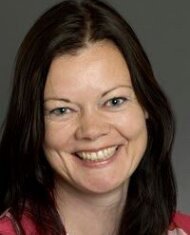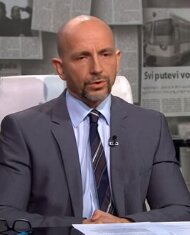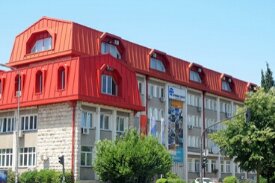Conference
Word, Image, Enemy
11. November 2013.
Phenomenon of securitization is a very important problem for the media, that leaves a profound negative effect on the lives of individuals, society and the state. According to Copenhagen School of Security Studies, the problem (situation, person, event, a process) becomes ''securitized,'' through a speech- act (or image), when it is presented as a “threat to security,” and all the methods of solving it become legitimate, since the problem represents a threat to society, people, and overall security. The media in the Western Balkans play a significant role in this process, since they are the ones that can be a tool in the hands of political elites and other interest groups, but also agents who independently put topics on the social and political agenda. The phenomenon of securitization leads to the collapse of the value system and the ethical-cultural dimension of the public interest and the public mission of information as a common good.
Recognizing the importance of this issue, the Balkan Perspectives Today, which has been addressing topics of importance to the media and gathering a large number of media experts since its beginnings, decided to organize a conference at which these issues would be raised and analyzed in a highly referential, argument-based, and professional manner.
On that occasion, in cooperation with the Media Council for Self-Regulation of Montenegro and the Montenegrin Journalist Associations, the PPI organized the then largest media conference in the region, held in Podgorica. The event brought together a number of national and European officials, a regional journalistic elite and well-known media experts. That the public's attention was sparked may be seen from the fact that more than 400 articles, reports, columns, comments, and interviews were published about the conference throughout the Western Balkans.
Conference Word, Image, Enemy—Role of Media in Securitization Process was held in Podgorica from November 11 to 13, 2013. Three very notable panels were held: "Power of media in the new millennium," "Issue marked as high-risk" and "The State as a State Enemy," as well as EX YU FORUM of journalists from Montenegro, Serbia, Croatia, Bosnia and Herzegovina, Kosovo, Macedonia. In addition to the conference, the multimedia exhibition "Word, Image and Enemy" was organized, with aim to show more than 1,000 copies of negative media coverage in the Western Balkans and around the world, as an example of direct violation of all ethical standards and norms of the journalistic profession . After its opening in Podgorica, the exhibition was also presented in other cities of Montenegro, in order to introduce as many people as possible to the problems of political instrumentalization in the media, human rights violations, ethics and standards of the journalistic profession.
The conference was organized by the Balkan Perspectives Today, the Media Self-Regulation Council of Montenegro, Association of Independent Electronic Media of Montenegro, Association of Commercial Electronic Media of Montenegro, Association of Montenegrin Journalist, Association of Local Print Media, with support from the Ministry of Culture and the Ministry of Human and Minority Rights of Montenegro.

.jpg)
.jpg)
.jpg)
.jpg)
.jpg)
.jpg)
.jpg)
.jpg)
.jpg)
.jpg)
.jpg)
.jpg)
.jpg)
.jpg)
.jpg)
.jpg)
.jpg)
.jpg)
.jpg)
.jpg)
.jpg)
.jpg)
.jpg)
.jpg)
.jpg)
.jpg)
.jpg)
.jpg)
.jpg)

.jpg)
.jpg)
.jpg)
.jpg)
.jpg)
.jpg)
.jpg)
.jpg)
.jpg)
.jpg)

.jpg)
.jpg)

.jpg)
.jpg)
.jpg)
.jpg)
.jpg)
.jpg)
.jpg)
.jpg)
.jpg)
.jpg)
.jpg)
.jpg)
.jpg)
17:00-17:20
First day of the Conference,November 11, 2013
Faculty of Economics, Podgorica
Opening Ceremony of the Conference "Word, Image and Enemy"
Participants:
Ranko Vujovic, Executive Secretary of the Media Council for Self-Regulation
Branislav Micunovic, the Minister of Culture of Montenegro
Suad Numanovic, Minister for Human and Minority Rights in Montenegro
Mitja Drobnic, Head of the Delegation of the European Union to Montenegro
17:20-19:00
PANEL I
"Power of media in the new millennium"
Participants:
Philippe Douste - Blazy, Special Advisor on Innovative Financing for Development in the UN
Efrem Radev, Senior Expert at the Regional Cooperation Council
Alessio Vinci, editor-in-chief of the Agon Channel in Albania
Andrzej Krajewski, media expert for KRRiT, Polish self-regulatory body
Antun Vujic, Minister of Culture of Croatia
Stevan Lilic, Professor at the University of Belgrade
Zoran Pazin, Representative of Montenegro to the European Court of Human Rights in Strasbourg
Moderator: Vanja Vardjan, journalist for RTV Slovenia
19:00-19:45
Coctail break
19:45-20:45
Book promotion
Aleksandar Stankovic: "Aca i sto faca"
Participant: Gordana Borovic, journalist
20:45-21:30
Book promotion
Seki Radoncic: "Anatomija jedne hajke"
Participants:
Jasenka Perovic, president of the association of families deported from BiH
Darko Sukovic, journalist
Andrei Nikolaidis, journalist
Moderator: Selena Tasic
09:00-09:20
Second day of the Conference, November 12, 2013
Hotel Ramada, Podgorica
Introductory speech
"Phenomenon of Media Role in the Securitization Process"
Keynote speaker: Lene Hansen, University of Copenhagen, International Relations
09:20-11:00
PANEL II
“Issue marked as high-risk”
Participants:
Florence Hartmann, former Hague tribunal spokeswoman
Nidzara Ahmetasevic, professor at the University of Graz
George Tzogopulous, research fellow at ELIAMEP institute in Athens
Mina Pejic, professor at Singidunum University
Bernard Nezmah, Assistant Professor at the Faculty of Philosophy in Ljubljana
Moderator: Filip Ejdus, Assistant Professor in the Security Studies at the Faculty of Political Sciences
11:00-11:15
Coffee break
11:15-12:15
PANEL III
"State as State Enemy"
Participants:
Velimir Curgus Kazimir, Media Expert
Nikola Tomic, Assistant to the Editor-In- Chief of journal Danas
Srdjan Kusovac, journalist and media adviser in Government of Montenegro
Mirjana Kusmuk, journalist
Svetislav Basara, write
12:15-12:45
PANEL IV
"Insider"
Participants:
Brankica Stanković, journalist
Jasmina Pasic, journalist
Mirjana Jevtović, journalist
Miodrag Čvorović, journalist
Moderator: Sonja Drobac, Editor-in-Chief of TV Prva, Montenegro
12:45-14:00
Lunch break
14:00-16:00
EX YU FORUM of journalists from Montenegro, Serbia, Croatia, Bosnia and Herzegovina, Kosovo, Macedonia
Topic: "New media and ethical standards: internet and regulation"
Participants:
Jaksa Scekic (Reuters SRB), Bosko Jaksic (Politics SRB), Petar Lukovic (E-newspaper SRB), Ivan Cvejic (Beta SRB), Goran Milic (Al Jazeera BIH), Borjan Jovanovski (MAK), Vanja Vardjan (RTV Slovenia SLO ), Adriatik Kelmendi (TVK, KOS), Slavko Mandic (CG Scale), Radojka Rutovic (RTCG, CG), Dario Novalic (START BiH magazine), Nikola Martinovic (CG), Nikola Vujanovic (CG), Amer Ramusovic (CG) , Budimir Damjanovic (CG), Milan Mica Jovanovic (SRB), Kristina Vujic (YUCOM SRB), Selena Tasic (CG-SRB Institute for Public Policy)
Moderator: Zeljko Rutovic, Assistant to the Minister of Culture in the Government of Montenegro
16:00-17:30
Topic: "Media power over human life"
Participants:
Vesna Malisic, NIN weekly, Serbia: "The power of the media over the lives of individuals”
Aleksandar Stankovic, Croatian journalist and TV presenter: "The value of human life in the Croatian media"
Benjamin Perks, UN Human Rights Expert and UNICEF Director in Montenegro: "Human rights violations in the media"
Mehmed Halilovic, Legal Advisor for Media Issues at Internews in BiH and Former Deputy Ombudsman for Media in the Federation of BiH: "Violation of Ethical Reporting Standards in the Bosnian Media"
Borjan Jovanovski, editor of the daily Vest from Macedonia
Moderator: Drasko Djuranovic, Editor-in-Chief of the Analitika portal, Montenegro
21:00-22:00
Opening of the exhibition "Word, Image and Enemy"
"Art Pavilion" Gallery
Participants:
Branko Vojicic, journalist and exhibition editor
Danilo Burzan, journalist

The Faculty of Economics in Podgorica was founded in 1960, by a decision of the National Assembly of the Republic of Montenegro, adopted on 31 May. The Faculty, which is the oldest institution of higher education in Montenegro, was originally part of the University of Belgrade. After the formation of Veljko Vlahovic University in April 1974, the Faculty became not only its member, but also its founder. Immediately after the decision to set up the Faculty, a Council of the Faculty of Economics was formed, whose membership included renowned socio-political workers, whose first session was held on October 31, 1960.
.jpg)
Podgorica is the capital and largest city of Montenegro, with a population of about 250,000. It is located at the mouth of the river Ribnica in Morac in the Zeta-Bjelopavica plain. The city is close to winter centers in the north of the country and resorts on the Adriatic Coast. Podgorica is also close to the remains of the Roman town of Dokleja. In the Middle Ages, there was a settlement here called Ribnica, and under the name Podgorica, the town was first mentioned in 1326. Since 1878, Podgorica has been part of the Principality of Montenegro. It has been the administrative seat of Montenegro since 1946, and during the SFRY it was called Titograd.